
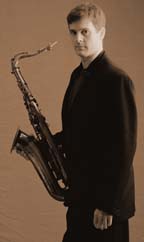
Courtesy of Eric Alexander
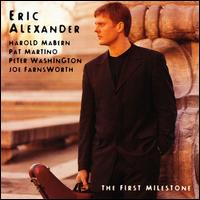
Milestone
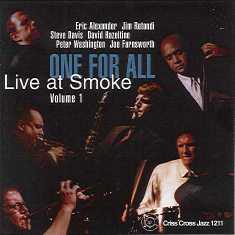
Criss Cross Records
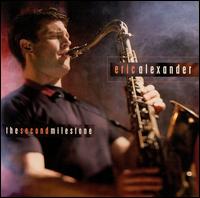
Milestone
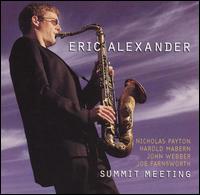
Milestone
A FIRESIDE
CHAT WITH ERIC ALEXANDER
I got
an album from Delmark a handful of years ago, Up, Over & Out, featuring
Eric Alexander, whom I hadn't heard of at the time (like the twelfth man
on the deal team, I usually last to know). The tenor's rendition of "I
Remember Clifford" was something else and to this day, it remains
one of my favorite recordings. Since, Alexander has made solid albums,
both as a leader and with his cooperative band, One for All, for Milestone
and Criss Cross respectively. I am pleased to share my conversation with
Alexander, a promising young tenor who has matured in impressive fashion,
as always, unedited and in his own words.
FRED
JUNG: Let's start from the beginning.
ERIC
ALEXANDER: It wasn't a specific event or there wasn't this moment where
suddenly I decided I was interested in pursuing this. It was sort of gradual.
My parents gave me a well-rounded exposure to music when I was young.
They would take me to see chamber music performances or a jazz performance
or whatever, folk music. My father had a big classical record collection
and so I did hear good music quite a bit when I was growing up, but like
a lot of other kids that were playing jazz band type instruments in junior
high and high school, I liked it. It was something that came pretty easily
to me, at least on a low level. It wasn't really until the end of high
school or maybe even getting in college when I started to get hip to some
of the classic recordings and the things that became really influential
to me. I had people around me that had a much greater awareness of the
history of the music and what great recordings were and who the people
to listen to were and they sort of turned me onto the right stuff and
that's when my interest really blossomed.
FJ:
And by classic recordings.
ERIC
ALEXANDER: At that time, I can remember, the first people that struck
me, I guess, and it was such sort of random luck because people made tapes
of these cats for me and I decided I liked it, were Dexter Gordon and
Stanley Turrentine and John Coltrane. In fact, I had some records of Trane
when I was in high school. When I got to college though, people exposed
me to a whole other world, Sonny Stitt. I started hearing some more Bird
recordings and Joe Henderson, Johnny Griffin, Hank Mobley, all the classic
Jazz Messengers stuff, the great Blue Note and Prestige recordings from
the Fifties and Sixties, all that stuff, just the whole pantheon of modern
jazz from Prez and Bird onward, all the good stuff.
FJ:
We last spoke prior to Man with a Horn's street date and since, you have
logged in some studio time releasing First Milestone, The Second Milestone,
and Summit Meeting, all featuring Harold Mabern.
ERIC
ALEXANDER: The first thing, as a horn player, playing with different pianists
in different situations, the first thing you notice about Harold that
stands out is what a great comper he is. When you are looking for a piano
player for a group, their solo ability is one thing, but the other thing
is their ability to propel the rhythm section and add distinctive flavor
to different tunes and different points in each tune and really be able
to color what you're doing and dot your "i"s and cross your
"t"s so to speak. When you are improvising, they can sort of
highlight what you're doing and he is such an attentive listener. It is
almost as if he has a second or third sense. What would you call that,
a sixth sense? We have five senses, so yeah, a sixth sense about what
you're about to play and what you can do to enhance it. It is really remarkable.
Plus he adds things that are always surprising and challenging for the
soloist to try and deal with, which is something that a lot of musicians
probably find to be a little overwhelming. For instance, I will be in
the middle of an improvisation and suddenly, he will change the harmonic
sequence of the tune, something that is logical and makes sense and is
based on what the original chord changes were, but is twisted a little
bit or slightly different. As the soloist, you have to hear it and go
with it or maybe get a little steamrolled by what he's doing and so you
have to be on your toes, if that makes any sense. So not only does he
enhance what you do, but he also makes it more challenging sometimes.
FJ: Three albums in three years have the trappings of repetition, but
the Milestone sessions are fresh.
ERIC
ALEXANDER: That is a complement, Fred. That's great. They were actually
recorded in a two year span. In terms of my own compositions, I am not
very good about being consistent with writing and taking care of that
on a daily basis. I usually need some sort of deadline and then I might
sit down and start working on things. As a musician, my main focus is
always just improving my vocabulary in the jazz language or getting myself
acquainted with so much material that I can be really creative in my improvisations
and be prepared for all sorts of different situations and in the course
of doing that, I am running musical ideas through my head all the time.
I usually have new approaches and new concepts when I actually sit down
to finally write something, but it is not something that I am actually
working on all the time. So on these records, I will usually include two
or three of my own originals that I come up with and feel are appropriate
considering who is on the date and what I am trying to do and I will try
to get Harold to contribute something or maybe two things and then we
just sort of brainstorm about standards, tunes that are rarely done, but
have chord progressions and melodies that are suitable for what we are
trying to get across or what we want to do. Then we will try to monkey
with the tunes a little bit and come up with our own twists visa the arrangements
or the introductions and endings. That is usually the formula. We try
to keep a mixture of originals, standards, although not the most common
standards, and maybe just a down home blues kind of feeling, but we like
to have different tempos, different beats, some Latin stuff, a ballad,
three, four, six, eight. Just keep it interesting so when that when people
are listening to the record, they don't get distracted by a sameness.
You want to feel that each tune is a new chapter. We are working really
hard. For whatever reason, I like to think it is partly a by product of
us working hard, but there are other forces involved too as you know,
Fred, in the jazz world. We have had a certain success with the last few
things we've done. I wouldn't say we are under pressure, but we feel sort
of compelled to really try and make sure that each succeeding project
is worthy of what we did before, if not better. We feel there is a certain
standard we have to live up to.
FJ: With success come expectations.
ERIC
ALEXANDER: Yeah, there are, but it is the kind of thing, we just try not
to get complacent.
FJ: And you still have the One for All band?
ERIC
ALEXANDER: Sure, we're going to do a record in December again.
FJ: The last session was a live record, Live at Smoke, for the Criss Cross
label.
ERIC
ALEXANDER: It's been a while since we've been in the studio, but that
group is always poised to record because we've got six different minds
working on six different piles of compositions and arrangements. It is
usually not very difficult to put together a record date. The problem
is just getting everybody in the same place at the same time.
FJ: Mirroring the Jazz Messengers, One for All has six leaders (Peter
Washington, Jim Rotondi, David Hazeltine, Joe Farnsworth, Steve Davis,
and Alexander), all with records (mostly on Criss Cross).
ERIC
ALEXANDER: I think to a man, we know that that group, especially down
the road, is going to be really important to our careers because a lot
of the master musicians that we are having a chance to play with now who
have been big names for a long time, unfortunately will not be around
so there needs to be other alternatives in terms of work for all of us.
That is something that is going to become more and more important as our
careers go further and further down the road.
FJ: Do you have a different compositional approach to the various projects?
ERIC
ALEXANDER: Yes, and let me say, not always, but sometimes. I think with
writing for a quartet or a smaller group, the three horn concept in One
for All, that really lends itself to certain kinds of writing devices
and certain techniques that you might want to employee, whereas if I am
doing something in a quartet setting, I try to keep things simple. I like
to have almost a blank slate upon which to write, just a simple structure,
a simple form, something that is catchy and go from there and let the
magic happen. With One for All, we're more concerned with the arrangements,
which take greater precedent than the actual writing. The improvisation
is important, but no one gets to stretch too much with One for All, so
the arrangement becomes even more important, whereas in the quartet setting,
we really stretch and the improvisation in more important.
FJ: I was on a road trip to Chicago and was going through the used CDs
in an obscure record store and came across a copy of Badlands, a session
you did with Rob Mazurek. Odd cover resemblance to Chet Baker and Stan
Getz.
ERIC
ALEXANDER: (Laughing) I know we had about two bottles of single malt scotch,
so maybe that is why it looks like Chet Baker and Stan Getz. They took
that photo in August of '95, so yeah (laughing).
FJ: And the future?
ERIC
ALEXANDER: I'll be in the studio for Milestone in December, along with
the One for All thing. I just did something two days ago with David Hazeltine,
sort of a follow up with the record I did with him, Lou Hayes, and Pete
Washington. On this particular record that we just completed, Joe Farnsworth
is playing drums, so it is slightly different. It is for Sharp Nine Records.
Dave is pretty much the guy in charge in terms of the writing and the
sequence and everything. It is kind of like the Classic Trio, but it is
without Louis Hayes. It is Joe Farnsworth. I'm pretty sure the Milestone
album with just be quartet and we're going to feature Ron Carter on bass.
I will probably just try to make this one a no holds barred quartet date,
even less arrangement than before, just a lot of free wheeling and blowing
and extended stuff. Harold and I have been talking about some of the material.
We've probably picked out four or five tunes at this point.
FJ: Tour dates?
ERIC
ALEXANDER: Yeah, I am going to Italy next week. Then I go out to the West
Coast and I will be back in Italy again in December for the new year.
I got just a mixture of stuff that is in town and out of town in the early
part of next year.
Fred Jung is the Editor-In-Chief and believes it was a fumble. Comments?
Email Him